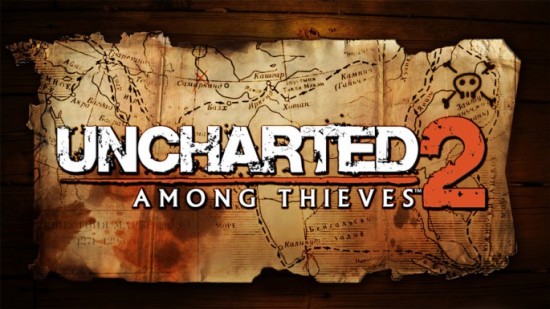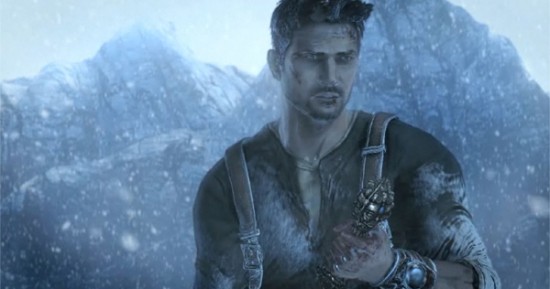Naughty Dog’s Uncharted 2: Among Thieves found Nathan Drake stealing nearly every GOTY award in 2009. If you think I’m kidding, check out Wikipedia’s entry [2] devoted entirely to honors received by the Playstation 3 exclusive. Among these awards are several honors for its score and composer Greg Edmonson. Most recently, Edmonson and his score received the honor from BAFTA [3] – consistently viewed as one of the more prestigious honors in the community.
Though mostly good, the first Uncharted was a bit of a mixed bag. My memories of unloading a clip into a dancing native’s face only to have him continue his ridiculous dodging routine are not my fondest gaming moments. The original’s score, though musical, did not stand out save for the main theme.
We know the second one improved gameplay and graphics immensely, but what of the score? Click the jump for my take!
The soundtrack kicks off with “Nate’s Theme 2.0”, which is a near-identical version to the previous soundtrack’s “Nate Theme.” Slightly fuller-sounding percussion and more vibrant horns make the second incarnation a bit more exciting – but it’s the same tempo (they both clock in at virtually the same time) and seems to be the exact same orchestration. As a piece of music and main theme, “Nate’s Theme 2.0” is quite good – it is catchy, energetic, and has a real noble aesthetic.
“Bustin’ Chops” is a great little action track. Edmonson seems to enjoy doubling strings with horns for emphasis throughout the soundtrack, but it is especially effective here alongside the highly percussive accompaniment. “Breaking and Entering” is a slow, almost jazzy tune, with a Middle Eastern mode. I confess that it is a tune that I heard too many times while playing through the game as I got busted by the guards a few too many times – especially on hard.
“Desperate Times” is a very tense and emotional piece heavy with strings. It is such a serious piece that I had to replay the game to recall any scene that could merit such a feeling of loss. The second half of the track is vastly different from the first and moves with considerable more drive yet retains much of the tense emotion of its slower first half. Retaining a lot of the previous themes, “Warzone” races in with a surprising amount of melody and musicality for the action track that it is. Whereas a large chunk of the music scoring action scenes survives very poorly outside of its original context, “Warzone” does not, as do most of the other action tracks on the soundtrack.
Perhaps the most interesting aspect of Edmonson’s score is his incorporating instruments from the Far East and Andean tradition. Sprinkled throughout the soundtrack, one can hear pan-flute-like wind instruments as well as chalango-like string instruments. In the track, “Broken Paradise”, Tibetan chant can be heard. I have always been a student of world musics, but the Tibetan chant was one aesthetic I could never adjust my ear to and – quite frankly – has always frightened me. A human voice singing more than one note at a time is something I could never get used to! Thankfully, the context in which this aesthetic is used here allows for this kind of frightened response which leads me to believe I am not the only one who feels this way.
The other tracks on the score are all quite good. In fact, I would venture to say there is not one dud on the soundtrack. Greg Edmonson outdid himself this time and managed to improve his previous score with the same tenacity and fervor that the developers experienced while making the sequel. As a piece of music, Uncharted 2: Among Thieves is quite easily one of the most musical and consistent scores of last year. However, as a soundtrack, it does not always hit on all the right notes. The score’s nobility and serious tone often feel a bit incongruous to Nathan Drake’s smart-ass attitude and the game’s romp-like feel.
The great soundtracks make themselves inseparable from the source material and I can’t help but feel that Edmonson’s score – as musical and often beautiful as it is – does not match up quite as well as some of the other greats as far as how iconic and identifiable it is with the game. When one hears the themes of Sonic the Hedgehog [5], Super Mario, and most recently, Kratos and [6]God of War [7], the images of the games, the characters, and the excitement of the series comes out all at once. Nathan Drake, though an iconic character, does not seem to have a theme and soundtrack that is as indistinguishable to his character as some of the others.
Uncharted 2: Among Thieves has an excellent soundtrack attached to its name. The music is top-notch, well-researched, and wonderfully musical; it is worthy of anyone’s collection. But, as a score to the characters, plot, and action taking place on the screen, Uncharted 2 may be just a bit too much with Marco Polo and a little less with Nathan Drake.


Comments Disabled To "UNCHARTED 2 Soundtrack Review: Marco Polo’s Lost Treasure?"
#1 Comment By Wes Chung On April 14, 2010 @ 5:18 pm
I’ll respect the BAFTAs a lot more when they finally give Murray Gold his due.
Actually, probably not, looking at the narrow field of nominees against which this soundtrack competed.
‘The great soundtracks make themselves inseparable from the source material’…We may not agree on that one (I’ve barely played God of War, for a start, and good lord do I love the God of War III OST), but the rest of your point in that paragraph is something I can back 100%. Without a theme that can become iconic (almost metonymical for the character and thus the game itself), game music might be relegated to ‘film score’ level consistency, regardless of the ‘iconic characters’ in said game. This is opposed by character-and-event driven game music, that spikes with instantly memorable themes — and the three you’ve named are perfect examples.
I feel very few film scores ever get reach that level of iconic characterisation — it hurts to admit that Dvorak’s favourite leech Williams pulled it off multiple times: not only with Indy’s theme, but Superman, Star Wars and possibly the one I love most, the unforgettably simple five-tone message of Close Encounters. It’s interesting that your belief that game music is ‘inseparable from the source’ is the same way I feel about movie soundtracks…which are, in turn, more and more commonly the model for game music soundtracks as big-name movie composers start to knuckle in on territory formerly dominated by dedicated game composers. Uematsu has never been credited with a live-action movie score, for example, and just to prove I’m not being exclusively Japanese here, neither has Matt Uelmen or Cris Velasco.
I’m particularly in agreement with your call that a serious, noble soundtrack representing Drake’s adventures is off the mark. I can imagine the composer seeing the material as a chance to show off all sorts of skills and possibly missing the fact that the heart of the ‘Uncharted’ games is not a noble but, technically, a noble in denial, a rascal bastard-son who eschews the connotations of his name in favour of purely Chaotic Good acts with lots of running *away*. (see, I do play some games…! :P)
I think that the way game composers negotiate this dichotomy between Hollywood-style game scores (which often fall back on tropes like ‘the epic war theme’, Horner-style ‘the romance theme’, Zimmer’s Gladiatorial ethnic moments, etc., etc. — rendering themselves outright boring as listening experiences) and traditional game music OSTs, which generally have more distinct but shorter tracks representing each character, locales/levels and events (including battle and boss themes, of course) is going to determine the future of game music as a product worthy of purchase.
(If anything, I think TV music is closer in tradition to the game OST, since both are geared for ten+ hours of experience, but that’s a whole other debate…)
#2 Comment By Gideon On April 14, 2010 @ 7:53 pm
Always appreciate the comments, Wes!
My comment about great soundtracks being inseparable from their source material is to say that the best scores marry themselves so beautifully and seamlessly to the action and/or characters that to listen to imagine the music with a different context would just seem wrong. As far as game music style vs film music style, you should check out Garry Schyman’s interview with me where he quite confidently insisted that there is no difference in the writing. Very interesting stuff!
Cheers!